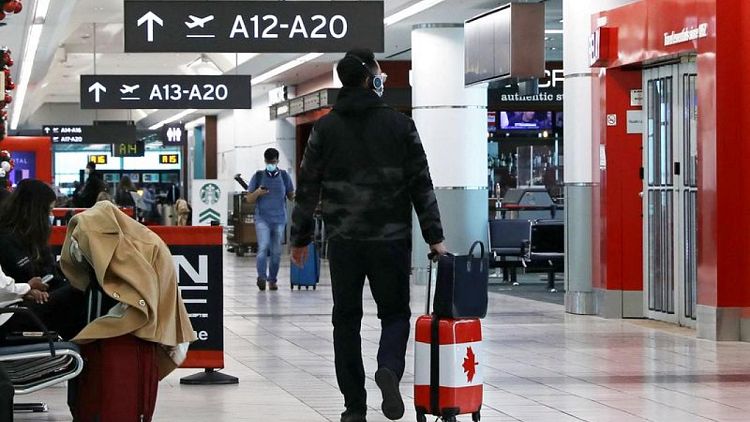By Anna Mehler Paperny
TORONTO - Canadian provinces are trying to ramp up vaccination and hand out more rapid tests amid a rising wave of the coronavirus pandemic driven by the Omicron variant, but efforts to head off infections are complicated by public fatigue almost two years into the pandemic.
Case numbers are increasing as the country's hospitals are still struggling to clear backlogs from months of postponed procedures. Many burnt-out staff are ill-equipped for another surge.
Most people in Canada, like other wealthy countries, haven't been infected with COVID-19. So if they lack vaccine protection they are especially vulnerable to Omicron, said Peter Jüni, director of Ontario's COVID-19 Science Advisory Table.
"What really worries me is that people are asleep at the steering wheel, internationally," he said.
"They have wishful thinking it will be mild ... This is not a realistic attitude."
Canada is expected to toughen restrictions on international travel with new measures to be announced on Wednesday, CBC News reported on Tuesday.
Meanwhile there is "massive vulnerability" in Canada's health care systems, said Toronto infectious disease doctor Andrew Morris, and it's "highly likely" it will be overwhelmed.
The intensive care unit doctor Christie Lee oversees at Mount Sinai Hospital in Toronto has been relatively lucky: They got some breathing room following the last COVID-19 wave, tried to give staff vacation time and have been able to train new critical care nurses. But they know their luck may not last.
"We've been told to prepare, potentially, for rapidly increasing cases," she said.
In Alberta, which saw a punishing fourth wave, doctor Christopher Doig's Calgary ICU still has COVID-19 patients, some of whom have been there for weeks. It is still operating at about 110% capacity, he said.
Shifting staff from other areas lets them "surge up" if needed. "The downside of those surges is it pulls staff from other areas," and the pandemic backlog of surgeries grows.
'THE VIRUS DOESN'T CARE'
Provinces have been reluctant to tighten restrictions again but some communities are taking matters into their own hands.
In Kingston, where the infection rate this week was the highest in Ontario, health officials have clamped down on private gatherings and the hours that indoor food and alcohol are allowed to be served. Singing, dancing and live music are prohibited at establishments serving food and drink.
Ontario said this week it is "temporarily interrupting" its return-to-office plan for provincial employees.
And health officials are trying to convince the public they need three vaccine doses, not two, to be safe.
Provinces including Manitoba have expanded third doses to everyone over 18. Ontario, Quebec, Alberta, British Columbia and other provinces have been rolling them out more slowly, targeting older or more medically vulnerable people first.
That may change: The president of Ontario's Hospital Association said on Twitter Monday hospitals are following instructions to "urgently re-activate mass vaccination programs." A spokesperson did not immediately respond when asked what impact this will have on care.
Amid fears of asymptomatic COVID-19 transmission, provinces given millions of rapid antigen tests by the federal government have come under fire for not distributing them more widely. Ontario promised to make 2 million tests available at "high-traffic" areas and to give five per student to school children this week. Quebec will be handing out five tests per person starting next week.
British Columbia health officials this week said they had not gotten the tests they were hoping for from the federal government and defended the province's providing tens of thousands of rapid tests a week to hundreds of private employers.
Jüni said he understands people are tired. "I'm completely exhausted. I've had it. I'm done completely. But the virus doesn't care."
